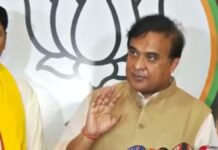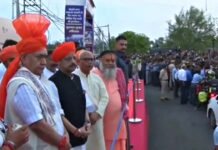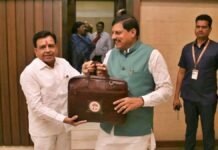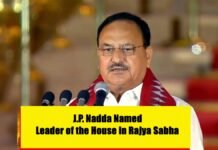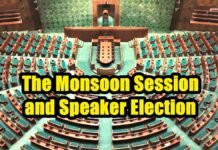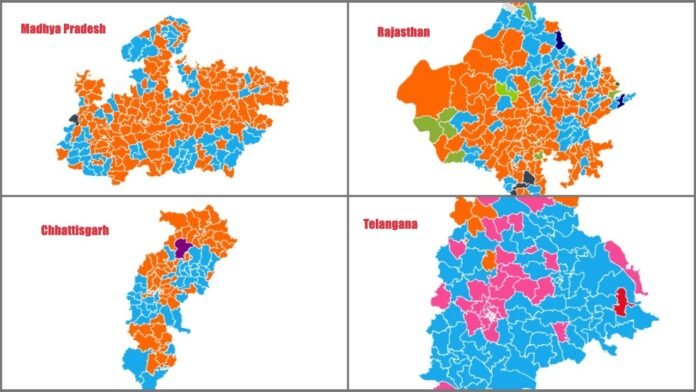
- The Bharatiya Janata Party (BJP) led by Prime Minister Narendra Modi has won a landslide victory in the assembly elections in Madhya Pradesh, Rajasthan, and Chhattisgarh.
- The Congress party has managed to secure a majority in Telangana.
New Delhi: The election results have boosted the BJP’s prospects for the 2024 Lok Sabha elections, while the Congress party has suffered a major setback and has called for a meeting of the opposition parties to prepare for the next polls.
The assembly elections in Madhya Pradesh, Rajasthan, Chhattisgarh and Telangana were held in November and December 2023, amid the COVID-19 pandemic and the economic slowdown. These states account for 91 Lok Sabha seats, out of which the BJP had won 76 in the 2019 general elections. The Congress had won only 12, while the BRS had won two and the AIMIM had won one.
The elections were seen as a semi-final before the 2024 Lok Sabha elections, as they tested the popularity of the incumbent governments, the performance of the opposition parties, and the impact of various factors such as the Modi factor, the caste equations, the women voters, and the majority mobilization.
According to the Election Commission of India (ECI) website, the BJP had either won or led on 164 seats in Madhya Pradesh, 115 seats in Rajasthan and 55 seats in Chhattisgarh, as of 7 pm on Sunday. The Congress party’s tally stood at 64 seats in Telangana, 107 seats in Madhya Pradesh, 91 seats in Rajasthan and 41 seats in Chhattisgarh. The others, including the BSP, the SP, the RLP, the JCC, the TJS, the AIMIM and the independents, had won or led on 12 seats in Rajasthan, six seats in Chhattisgarh, four seats in Telangana and two seats in Madhya Pradesh.
Analysis and reactions
The BJP has emerged as the clear winner in the assembly elections, with a massive two-thirds majority in Madhya Pradesh, a comfortable majority in Rajasthan and a close victory in Chhattisgarh. The BJP has successfully overcome the anti-incumbency factor, the farmer distress, the unemployment crisis and the corruption allegations in these states, by relying on the charisma and popularity of Prime Minister Modi, the strong organizational network of the party, the effective use of social media and the mobilization of the majority community.
The Congress party has failed to capitalize on the discontent and dissatisfaction of the voters in the Hindi heartland states, where it was the principal opponent of the BJP. The Congress party has suffered from the lack of a clear leadership, a coherent vision, a credible alliance and a convincing campaign in these states. The Congress party’s heavy dose of sops and welfare measures, and the issue of the Caste census, have failed to turn the tide in its favour.
The Congress party has got its sole success in Telangana, where it has snatched the state from the BRS, which had dissolved the assembly in September 2018, nine months before the end of its term, and had won 88 seats in the snap polls held in December 2018. The Congress party has formed a coalition with the TDP, the CPI and the TJS, which is called the Praja Kutami (People’s Alliance), and has managed to win the support of the voters, who were unhappy with the policies and governance of the BRS.
The BJP has congratulated the people of the states for choosing the party and has thanked Prime Minister Modi for his leadership and guidance. Modi has said that the results in Madhya Pradesh, Rajasthan and Chhattisgarh indicate that the people of India are firmly with the politics of good governance and development. He has also said that the current trend will continue in the coming times.
The Congress party has expressed disappointment and shock over the poll outcome and has accepted the verdict of the people. The Congress party has also called for a meeting of the opposition parties to make strategies for the Lok Sabha elections due early next year. The Congress party’s president Mallikarjun Kharge has said that the party will overcome the temporary setbacks and prepare itself fully for the forthcoming Lok Sabha elections along with the ‘INDIA’ parties.
The exit polls, which were released after the last phase of polling on December 2, had predicted a win for the Congress in Chhattisgarh and a close fight in Rajasthan, but the results have come otherwise. Some of the pollsters had projected a close fight between the Congress and the BJP in Madhya Pradesh, but the actual result shows that the grand old party was nowhere in the race against its rival.
Future prospects
The assembly election results have implications for the 2024 Lok Sabha elections, as they reflect the mood of the voters and the strategies of the parties in the key battleground states. The BJP has consolidated its position in the Hindi heartland, which is crucial for its national ambitions, and has prevented the Congress from gaining momentum. The BJP will try to address the grievances of the voters and strengthen its organizational base in these states, while also expanding its reach in other regions, such as the south and the east.
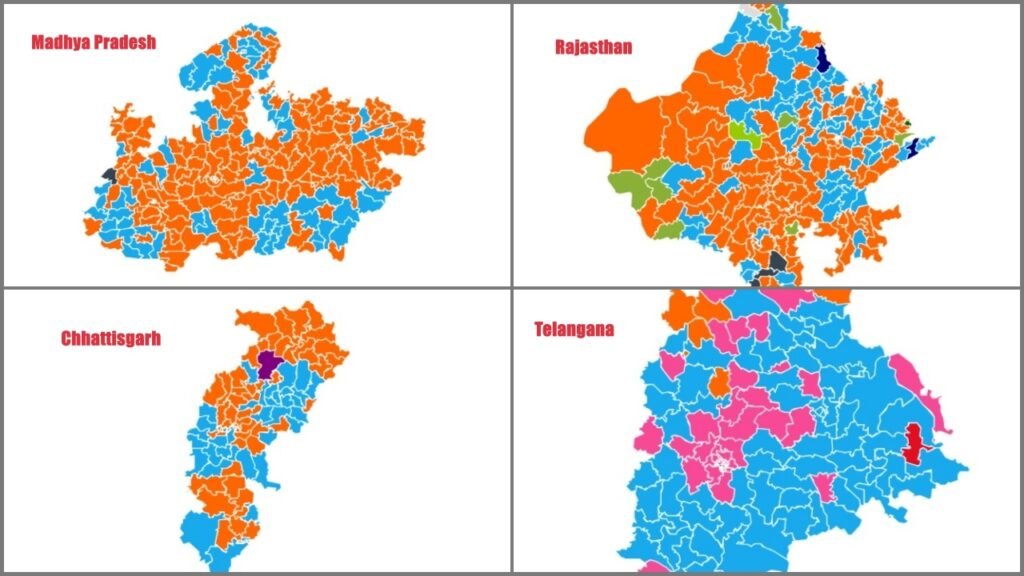
The Congress party has lost its grip over the Hindi heartland, where it had hoped to revive its fortunes and challenge the BJP. The Congress party will have to introspect on its leadership, its alliance partners, its manifesto and its campaign strategy in these states, and also in other states, where it faces competition from the regional parties. The Congress party will also have to forge a strong and united opposition front against the BJP, by reaching out to the other parties that share its ideology and vision.
The regional parties, such as the BSP, the SP, the RLP, the JCC, the TJS, the AIMIM and the BRS, will have a marginal role to play in the assembly elections, as they will fail to make a significant impact on the vote share or the seat share. However, they may still have some relevance in the Lok Sabha elections, as they may join hands with either the BJP or the Congress or form a third front, depending on their interests and agendas.
















